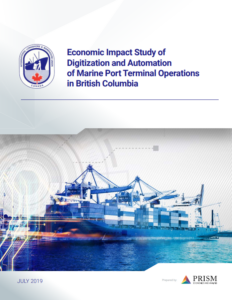According to a recent economic forecast, the International Longshore and Warehouse Union Canada said that automation will cut thousands of good jobs at marine terminal operations in British Columbia. This would cost millions of dollars from the provincial economy per year, the forecast notes.
Commenting on the report, Rob Ashton, President of the International Longshore and Warehouse Union Canada, stated that automation is sweeping the marine industry world-wide with steep declines in employment of up to 90%.
The study concluded that automation could eliminate over 9200 marine terminal jobs across BC, taking into account new employment automation may create. The provincial economy stands to take a material hit from income lost in excess of $600 million annually, with tax revenues reducing more than $100 million a year.
Disruption on this scale will be felt by the provincial economy and will have an acute effect in some local communities, particularly those that rely on this industry for good jobs and the economic benefits they bring locally
explains John O’Grady, founding partner of PRISM Economics and Analysis which conducted the forecast.
[smlsubform prepend=”GET THE SAFETY4SEA IN YOUR INBOX!” showname=false emailtxt=”” emailholder=”Enter your email address” showsubmit=true submittxt=”Submit” jsthanks=false thankyou=”Thank you for subscribing to our mailing list”]
The study expects that 11% of middle-income employment and 23% of high-income employment ($100,000+ per year) in the community of Delta alone risk being eliminated because of future automation in the marine terminal industry.
Namely, in Prince Rupert, one quarter of middle-income and fully two-thirds of high-income employment is at risk of elimination due to future automation.
According to Mr. Ashton, the companies that automate these jobs out of existence will benefit, adding that it is clear that workers, communities and governments would be left to pick up the pieces after the damage is done.
In order to mitigate job loss from automation in the marine terminal and other sectors of the economy, the ILWU Canada urged all federal party leaders to commit to modernize Canada’s approach to labour market adjustment.
In spite of widespread disruption to many industries in our country, there has not been a single major change in workforce adjustment programs in Canada for 30 years, apart from actual cuts to the Employment Insurance program to further disqualify workers
Mr. Ashton mentioned.
The union also called all governments to stop rewarding companies with tax breaks and subsidies when they automate good middle-class jobs out of existence to their exclusive benefit.
Explore more in the following PDF





























































